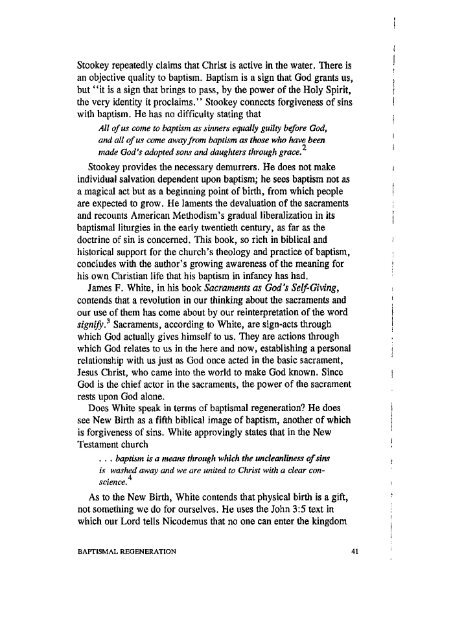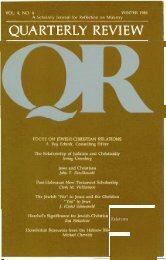TJieodore W. Jennings, Jr. The Meaning of ... - Quarterly Review
TJieodore W. Jennings, Jr. The Meaning of ... - Quarterly Review
TJieodore W. Jennings, Jr. The Meaning of ... - Quarterly Review
Create successful ePaper yourself
Turn your PDF publications into a flip-book with our unique Google optimized e-Paper software.
Stookey repeatedly claims that Christ is active in the water. <strong>The</strong>re is<br />
an objective quality to baptism. Baptism is a sign that God grants us,<br />
but **it is a sign that brings to pass, by the power <strong>of</strong> the Holy Spirit,<br />
the very identity it proclaims." Stookey connects forgiveness <strong>of</strong> sins<br />
with baptism. He has no difficulty stating that<br />
All <strong>of</strong> us come to baptism as sinners equally guilty before God,<br />
and all <strong>of</strong> us come away from baptism as those who have been<br />
made God's adopted sons and daughters through grace?<br />
Stookey provides the necessary demurrers. He does not make<br />
individual salvation dependent upon baptism; he sees baptism not as<br />
a magical act but as a beginning point <strong>of</strong> birth, from which people<br />
are expected to grow. He laments the devaluation <strong>of</strong> the sacraments<br />
and recounts American Methodism's gradual liberalization in its<br />
baptismal liturgies in the early twentieth century, as far as the<br />
doctrine <strong>of</strong> sin is concerned. This book, so rich in biblical and<br />
historical support for the church's theology and practice <strong>of</strong> baptism,<br />
concludes with the author's growing awareness <strong>of</strong> the meaning for<br />
his own Christian life that his baptism in infancy has had.<br />
James F. White, in his book Sacraments as God's Self-Giving,<br />
contends that a revolution in our thinking about the sacraments and<br />
our use <strong>of</strong> them has come about by our reinterpretation <strong>of</strong> the word<br />
signify. 3<br />
Sacraments, according to White, are sign-acts through<br />
which God actually gives himself to us. <strong>The</strong>y are actions through<br />
which God relates to us in the here and now, establishing a personal<br />
relationship with us just as God once acted in the basic sacrament,<br />
Jesus Christ, who came into the world to make God known. Since<br />
God is the chief actor in the sacraments, the power <strong>of</strong> the sacrament<br />
rests upon God alone.<br />
Does White speak in terms <strong>of</strong> baptismal regeneration? He does<br />
see New Birth as a fifth biblical image <strong>of</strong> baptism, another <strong>of</strong> which<br />
is forgiveness <strong>of</strong> sins. White approvingly states that in the New<br />
Testament church<br />
. . . baptism is a means through which the uncleanliness <strong>of</strong> sins<br />
is washed away and we are united to Christ with a clear conscience.<br />
As to the New Birth, White contends that physical birth is a gift,<br />
not something we do for ourselves. He uses the John 3:5 text in<br />
which our Lord tells Nicodemus that no one can enter the kingdom<br />
BAPTISMAL REGENERATION 41












